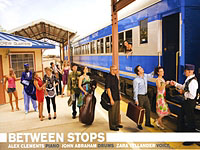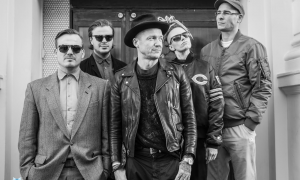Home » Jazz Articles » Live Review » Havard Wiik: Reinventing the Piano Jazz Trio in Ukraine
Havard Wiik: Reinventing the Piano Jazz Trio in Ukraine
Wiik's music answers an urgent need in the present for music that, however visceral, emotional and 'serious,' is equally witty, inventive, and thought-provoking.
Concert Hall of Tchaikovsky National Academy of Music
Kyiv, Ukraine
April 18, 2009

Håvard Wiik, a pianist known for his own groups as well as for his work in Atomic, Free-Fall, and Motif, is the present and the future of the Norwegian jazz scene. A gifted player and composer, he has already recorded a piano solo album, highly-acclaimed duos with young talented saxophonist Hakon Kornstad, and two albums with his own trio. The second reincarnation of this trio (including bassist Ole Morten Vågan and drummer Håkon Mjåset Johansen) recently performed a ceaselessly sparkling gem of a program in Concert Hall of Tchaikovsky National Academy of Music.
The concert by the trio displayed a tightly integrated unit on its way to certain international renown. Their music is multi-layered and diverse, articulating themes that appear and reappear in original compositions that stress spontaneous and thoughtful improvisation.
The very incisive "Odradek" melody, Nordically restrained and engaging, emerged like summer thunder. Though appearing at first glimpse a bit strict and straight, it proved complex and wondrous. Piano phrases, initially withheld and mysterious, soon joined sprightly melodies and rhythmic chord battering. Vågan attacked the bass with a staggering slap producing shrill sounds. Complementing him, Johansen's drumming was extremely flexible and evenly distributed among percussion instruments—none of the resulting sounds were harsh or atavistic.
The second number of the set, "Malachi," was melodically and harmonically intricate. Comping by lightly touching the keys in a manner reminiscent of Bill Evans' early playing, the dynamics deliberately brought to the fore Vågan's minimalistic bass, accentuated with Johansen's brushes. Then the rhythm section's work intensified, giving way to Wiik's speeded-up arpeggios, along with pedaling that animated the colors on a massive and exciting but organized musical canvas. As subtly as he creates unexpected musical events, he suspends them with no more warning.

On "Enology" Vågan delivered a sonorous arco bass solo, extracting one consonant tone or adding another dissonant one. Drummer Johansen began playing on just one snare drum with brushes: holding a brush in one hand to produce slightly audible hisses, he would suddenly explode, bringing both brushes to bear with all his might.
Repeatedly, Wiik shows a mastery at creating space through judicious, dramatic pauses. Each minimal opening in turn was crisply filled with drum matter. Johansen makes this work either by moving quickly around the drum set, pounding drums and cymbals with hammers or just by thorough, bright and witty activity. Trio's playing seems like intentionally angular swing, though it's a unique rhythm pulse that can be fascinating and bewildering.
"Arcades" began with calm and slow piano, until bass and drums entered at a dramatically faster tempo. The hall resonated with a huge wall of sound: the piano produced thunderous chords and the bass aggressively spit out bullet-like sounds, Johansen all the while subjecting his instrument to a furious thrashing. The next piece, the melodic "Italics," brought the set to logical and satisfying closure, featuring powerful post-bop lines played over an insistent but firm rhythm.
Two brief encores followed: the first with a contained, minimalist melody repeated with subtle variations; the second, the strenuous "188," employing ingeniously-placed open spaces between incisively-chiseled phrases.
Trio's concert performance, though based largely on The Arcades Project (Jazzland Recordings, 2007), went far beyond the album's tunes. The live versions evidenced a much freer, more abstract approach, without sacrificing the cleverness of Wiik's compositions. Wiik's music answers an urgent need in the present for music that, however visceral, emotional and "serious," is equally witty, inventive, and thought-provoking.

Photo Credit
Courtesy of Aretem Artemenko
Tags
PREVIOUS / NEXT
Support All About Jazz
 All About Jazz has been a pillar of jazz since 1995, championing it as an art form and, more importantly, supporting the musicians who make it. Our enduring commitment has made "AAJ" one of the most culturally important websites of its kind, read by hundreds of thousands of fans, musicians and industry figures every month.
All About Jazz has been a pillar of jazz since 1995, championing it as an art form and, more importantly, supporting the musicians who make it. Our enduring commitment has made "AAJ" one of the most culturally important websites of its kind, read by hundreds of thousands of fans, musicians and industry figures every month.























